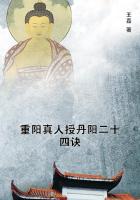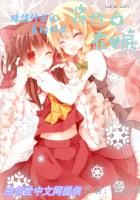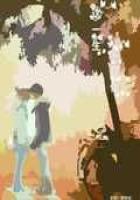The riders of the Muleshoe outfit were eating breakfast when Bud rode past the long, low-roofed log cabin to the corral which stood nearest the clutter of stables and sheds. He stopped there and waited to see if his new boss was anywhere in sight and would come to tell him where to unpack his belongings. A sandy complexioned young man with red eyelids and no lashes presently emerged from the stable and came toward him, his mouth sagging loosely open, his eye; vacuous.
He was clad in faded overalls turned up a foot at the bottom and showing frayed, shoddy trousers beneath and rusty, run-down shoes that proved he was not a rider. His hat was peppered with little holes, as if someone had fired a charge of birdshot at him and had all but bagged him.
The youth's eyes became fixed upon the guitar and mandolin cases roped on top of Sunfish's pack, and he pointed and gobbled something which had the sound speech without being intelligible. Bud cocked an ear toward him inquiringly, made nothing of the jumble and rode off to the cabin, leading Sunfish after him. The fellow might or might not be the idiot he looked, and he might or might not keep his hands off the pack. Bud was not going to take any chance.
He heard sounds within the cabin, but no one appeared until he shouted, "Hello!" twice. The door opened then and Bart Nelson put out his head, his jaws working over a mouthful of food that seemed tough.
"Oh, it's you. C'm awn in an' eat," he invited, and Bud dismounted, never guessing that his slightest motion had been carefully observed from the time he had forded the creek at the foot of the slope beyond the cabin.
Bart introduced him to the men by the ****** method of waving his hand at the group around the table and saying, "Guess you know the boys. What'd yuh say we could call yuh?"
"Bud--ah--Birnie," Bud answered, swiftly weighing the romantic idea of using some makeshift name until he had made his fortune, and deciding against it. A false name might mean future embarrassment, and he was so far from home that his father would never hear of him anyway. But his hesitation served to convince every man there that Birnie was not his name, and that he probably had good cause for concealing his own. Adding that to Dirk Tracy's guess that he was from Jackson's Hole, the sum spelled outlaw.
The Muleshoe boys were careful not to seem curious about Bud's past. They even refrained from manifesting too much interest in the musical instruments until Bud himself took them out of their cases that evening and began tuning them.
Then the half-baked, tongue-tied fellow came over and gobbled at him eagerly.
"Hen wants yuh to play something," a man they called Day interpreted. "Hen's loco on music. If you can sing and play both, Hen'll set and listen till plumb daylight and never move an eyewinker."
Bud looked up, smiled a little because Hen had no eyewinkers to move, and suddenly felt pity because a man could be so altogether unlikeable as Hen. Also because his mother's face stood vividly before him for an instant, leaving him with a queer tightening of the throat and the feeling that he had been rebuked. He nodded to Hen, laid down the mandolin and picked up the guitar, turned up the a string a bit, laid a booted and spurred foot across the other knee, plucked a minor chord sonorously and began abruptly:
"Yo' kin talk about you coons a-havin' trouble--Well, Ah think Ah have enough-a of mah oh-own--"
Hen's high-pointed Adam's apple slipped up and down in one great gulp of ecstasy. He eased slowly down upon the edge of the bunk beside Bud and gazed at him fascinatedly, his lashless eyes never winking, his jaw dropped so that his mouth hung half open. Day nudged Dirk Tracy, who parted his droopy mustache and smiled his unlovely smile, lowering his left eyelid unnecessarily at Bud. The dimple in Bud's chin wrinkled as he bent his head and plunked the interlude with a swing that set spurred boots tapping the floor rhythmically.
"Bart, he's went and hired a show-actor, looks like." Dirk confided behind his hand to Shorty McGuire. "That's real singin', if yuh ask me!"
"Shut up!" grunted Shorty, and prodded Dirk into silence so that he would miss none of the song.
Since Buddy had left the pink-apron stage of his adventurous life behind him, singing songs to please other people had been as much a part of his life as riding and roping and eating and sleeping. He had always sung or played or danced when he was asked to do so--accepting without question his mother's doctrine that it was unkind and ill-bred to refuse when he really could do those things well, because on the cattle ranges indoor amusements were few, and those who could furnish real entertainment were fewer. Even at the University, coon songs and Irish songs and love songs had been his portion; wherefore his repertoire seemed endless, and if folks insisted upon it he could sing from dark to dawn, providing his voice held out.
Hen sat with his big-jointed hands hanging loosely over his knees and listened, stared at Bud and grinned vacuously when one song was done, gulped his Adam's apple and listened again as raptly to the next one. The others forgot all about having fun watching Hen, and named old favorites and new ones, heard them sung inimitably and called for more. At midnight Bud blew on his blistered fingertips and shook the guitar gently, bottom-side up.
"I guess that's all the music there is in the darned thing to-night," he lamented. "She's made to keep time, and she always strikes, along about midnight."
"Huh-huh!" chortled Hen convulsively, as if he understood the joke. He closed his mouth and sighed deeply, as one who has just wakened from a trance.
After that, Hen followed Bud around like a pet dog, and found time between stable chores to groom those astonished horses, Stopper and Smoky and Sunfish, as if they were stall-kept thoroughbreds. He had them coming up to the pasture gate every day for the few handfuls of grain he purloined for them, and their sleekness was a joy to behold.

